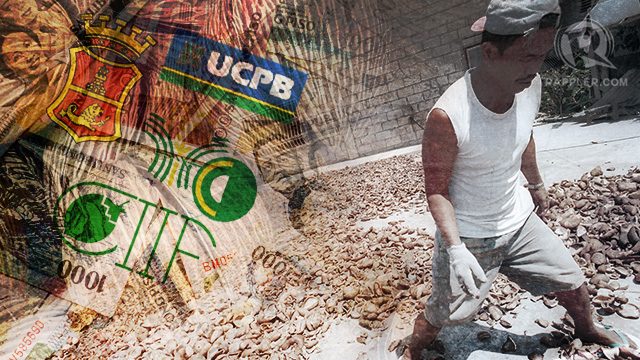SUMMARY
This is AI generated summarization, which may have errors. For context, always refer to the full article.

MANILA, Philippines – Despite President Rodrigo Duterte’s promise and a Supreme Court (SC) ruling, coconut farmers would have to wait longer for the turnover of P83 billion in coconut levy funds or taxes imposed on them during the Marcos administration. (READ: Coco levy fund scam: Gold for the corrupt, crumbs for farmers)
This is due to ongoing court challenges, more than 30 years after the case was first filed and even after the SC made a final ruling in 2014 that no further hearings are needed. (READ: The politics of the coco levy scam: From Marcos to Noynoy Aquino)
In a 19-page resolution issued last December 29, the Sandiganbayan 2nd Division ruled in favor of the request of United Coconut Planters Bank (UCPB) and the United Coconut Planters Life Assurance Corporation (Cocolife) to be heard on how the court ruling would affect their operations.
The two companies are among the businesses that are part of the Coconut Industry Investment Fund (CIIF) owned by Eduardo “Danding” Cojuangco Sr and other Marcos cronies. These companies were funded by the taxes collected from poor coconut farmers.
The resolution, penned by Associate Justice Michael Frederick Musngi and concurred in by Associate Justices Oscar Herrera Jr and Lorifel Pahimna, ordered more hearings on the case to determine the proper disposition of the assets.
The resolution states that the 2004 Sandiganbayan ruling favoring the farmers, and upheld by the SC, is not automatic but remains discretionary on the part of the court.
It also ruled that “it is prudent to give the parties the opportunity to expound on their respective positions on the relevance of the said Decision in resolving the clashing positions.”
This is contrary to the SC decision in 2014. The SC affirmed with finality the anti-graft court’s 2004 decision that awarded shares of San Miguel Corporation, another Cojuangco company, to the government.
It also ruled with finality that “there is no more necessity of further trial” on the issue of ownership of the sequestered shares and that the funds “be used only for the benefit of all coconut farmers and for the development of the coconut industry.”
While not exactly reverting the case to zero, the ruling practically disregarded much of the government’s previous victories. It also opens new doors for further legal challenges – the same reason the case has been delayed for more than 3 decades.
“As this case is set for a hearing, we deem it unnecessary as of the moment to address the other issues presented,” the Sandiganbayan said.
UCPB, Cocolife
UCPB protested that the grant of the partial execution would hurt its own interests.
It also proposed that the P56-billion proceeds of the sale of SMC shares including interest should be returned to 14 holding companies from the Bureau of the Treasury (BTr).
It also argued that while the Sandiganbayan and the SC ruled that the government owns the shares, there was no order for their dissolution and liquidation.
It asked the court to declare that it remains “owner” of the proceeds and dividends of the SMC shares until these are dissolved and liquidated.
In addition, it asked permission to use the money from the SMC shares to pay its debts “to avoid unwarranted loan defaults and cessation of business operations.”
Cocolife, on the other hand, said the partial execution would adversely affect its interests as P7 billion of its P9.076-billion total assets is involved.
“An execution of the partial summary judgment will greatly reduce [Cocolife’s] net worth…which may eventually result in the closure and liquidation of the company,” the insurance firm said.
Duterte made it his campaign promise to return the coco levy funds to the coconut farmers, among the country’s poorest of the poor. But to date, this has yet to happen. The President has yet to rally his allies in Congress to pass a law that would create a trust fund and utilize the money. (READ: Return coco levy to farmers? Duterte’s promise and political will)
Duterte has also admitted that Ramon Ang, president and chief executive officer of San Miguel Corporation and a protégé of Cojuangco, is his friend and campaign donor. (READ: Meet Ramon Ang, Filipino billionaire and Duterte’s friend) – Rappler.com
Add a comment
How does this make you feel?
![[In This Economy] A counter-rejoinder in the economic charter change debate](https://www.rappler.com/tachyon/2024/04/TL-counter-rejoinder-apr-20-2024.jpg?resize=257%2C257&crop=267px%2C0px%2C720px%2C720px)
![[Vantage Point] Joey Salceda says 8% GDP growth attainable](https://www.rappler.com/tachyon/2024/04/tl-salceda-gdp-growth-04192024.jpg?resize=257%2C257&crop_strategy=attention)
![[ANALYSIS] A new advocacy in race to financial literacy](https://www.rappler.com/tachyon/2024/04/advocacy-race-financial-literacy-April-19-2024.jpg?resize=257%2C257&crop_strategy=attention)


There are no comments yet. Add your comment to start the conversation.